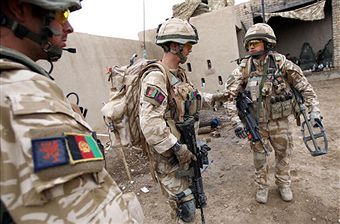 A few days ago, BBC Newsnight ran in effect the first live TV debate between the three parties when Secretary of State for Defence, Bob Ainsworth, Shadow Defence Secretary, Liam Fox, and Liberal Democrat defence spokesperson Nick Harvey shared a platform at the Imperial War museum.
A few days ago, BBC Newsnight ran in effect the first live TV debate between the three parties when Secretary of State for Defence, Bob Ainsworth, Shadow Defence Secretary, Liam Fox, and Liberal Democrat defence spokesperson Nick Harvey shared a platform at the Imperial War museum.
The programme was meant to focus on the main issues facing the future of British defence and security. In the event, it defaulted to a discussion about Afghanistan. Despite Jeremy Paxman’s prodding, many of the strategic questions were shirked as an audience of generals and airmen fought each other over which service had played a bigger role in the Afghan theatre, and the issue of veteran’s care took centre-stage. Liam Fox came out best, but you would expect that given who he was surrounded by.
But the absence of a strategic defence debate is a problem. My colleague Nick Witney, a former senior MoD official, has posted an excellent piece in which he explicitly asks that the “contented rumination of the usual sacred cows” be disturbed. His key point is that the current (non)debate and the recent Green Paper show too little awareness of the enormous international changes that have taken place since the last defence review.
‘It is hard now to recall the sense of optimism with which the old millennium closed. The triumph of liberal democracy across the globe seemed assured: and the victors of the Cold War seemed to have both the right and the duty to fare forth, right the world’s wrongs, and generally make it a better place. America bestrode the world, with Britain as its loyal first lieutenant; Milosevic was humbled in Kosovo; NATO and the EU were enlarging, to establish a vast new swathe of stability and security in eastern Europe. Tyrants everywhere were in retreat.
No wonder Britain was prepared to base its defence policy on interventionism, and explicitly to size its armed forces so as to be able to provide a chunky, free-standing contribution to any US-led operation.
Now, of course, most of this millenarian zeal has simply run into the sands of two debilitating Middle Eastern wars. Iraq offered an early test of the concept of British influence over the American leviathan – testing it, as it turned out, to destruction. And, far from accepting Britain’s self-appointed role as deputy in charge of restraining European defence, the US has formed its own view, come round to supporting the endeavour, and left the increasingly euro-sceptical British high and dry – more royalist than the king.
Nor is American power itself what it was: the unipolar moment has passed, globalisation has redistributed power to the south and east, and ‘the West’, whether understood to mean free-market capitalism or democratic values, is no longer the unchallenged arbiter of global norms.’
Nick asks that two questions be debated without prejudice: How best Britain can shape and use its military capacity so as to maximise its global power and influence? And how can we use that capacity and expertise to maximise our influence within Europe, and Europe’s influence in the world?
Whether you agree with Nick’s answers is not important; his underlying points need to be debated.






Comments